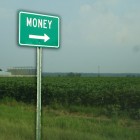Background
This page is no longer being updated. For ongoing coverage of this topic, go to New Hampshire Public Radio.
______
The Past
Historically, New Hampshire, like much of New England, depended heavily on paper and grain mills to support its economy. With the decline of mill work throughout the 20th century, the state came to lean on traditional manufacturing as an economic driver. And although manufacturing is still an important part of New Hampshire’s economy, advances in technology and the decline of traditional fabrication work all over the country means factories employ far fewer people than in the past. Toward the end of the 20th century, Massachusetts became a center for high-tech sectors. And in turn, New Hampshire has been able to piggy-back off its neighbor’s success, moving its economy toward electronic component manufacturing and other high-tech industries.
Despite these historic challenges, overall, compared to the rest of the country, New Hampshire’s economy is still considered robust. Among other things, the state boasts one of the highest median household incomes in the country, $61,042.
But talking about New Hampshire’s economy as a whole is tricky business. That’s in part because the state’s culturally–and often economically–distinguished by its regions. So while tourism is central to the Lakes Region economy, it’s less prominent in the Merrimack Valley. And although high-tech work is integral to the Seacoast and Upper Valley economies, it’s much less a factor in the North Country. But keeping regional differences in mind, some overarching statewide trends do emerge.
Current Trends
At this point, a few industries act as main drivers for the state’s economy:
- Smart Manufacturing/High Technology (SMHT): SMHT is the largest and most important sector of the state’s economy. New Hampshire’s SMHT sector is mainly known for using high-tech equipment to produce electronic components. In 2009, the New Hampshire Center for Public Policy studies found SMHT accounted for 19 percent of wages paid in the state. Much of the SMHT activity is concentrated along the Seacoast and in the Upper Valley. The Merrimack Valley and Monadnock Region also host a number of manufacturing operations.
- Tourism: New Hampshire has traditionally depended on its natural resources and recreational opportunities to draw in out-of-state visitors throughout the year. The Seacoast, Lakes Region, and White Mountains are the primary tourism hotspots. While the state keeps careful track of day trippers and overnight guests, a less-studied aspect of New Hampshire’s tourism economy is its popularity as a site for second homes. Many of the state’s vacation homes are owned by out-of-staters who visit communities for several weeks or months at a time, pump money into communities, and demand few services in return. The flip-side of this deal, however, is that in a community’s off-season, service work can become scarce as the town empties out.
- Health Care Fields: The Seacoast is a major hub for biomedical research in New Hampshire. And thanks to Dartmouth-Hitchcock Medical Center, the Upper Valley has become another center for biotech and other medical research. The state also hosts ten major hospitals, in addition to smaller facilities, that employ a number of health care workers.

Plashing Vole / Flickr
While New Hampshire's economy is relatively strong, it's still taken some heavy blows since the recession began
New Hampshire Since The Great Recession
Although the state has been doing better compared to most of the country, the Great Recession has still been hard on New Hampshire.
- Until recently, the health field was the one sector in which New Hampshire consistently saw job growth, despite the recession. But recent state budget cuts have hit hospitals hard, and the largest facilities have laid-off hundreds of workers.
- The state has lost nearly 30,000 jobs since the recession began. But despite these losses, New Hampshire’s unemployment rate remains lower than the national average. Joblessness hit its high-water mark–6.7 percent–at the end of 2009 and beginning of 2010. By August of 2011, the state’s seasonally-adjusted unemployment rate was 5.3 percent compared to 9.1 percent nationally. But it’s still significantly higher than the state’s pre-recession unemployment rate of 3.4 percent.
- The housing market is still struggling. The state was better protected than some areas, thanks to the dominance of small banks and credit unions, which maintained conservative lending practices. In 2011, they were still above the normal rate, at 343 foreclosure deeds issued in June of 2011. That represents a nine percent decrease from the previous year, but it’s still well above normal.
The Future

Abdulsalam Haykal / Flickr
The demographic change often called "The Graying of New Hampshire" could have far-reaching economic consequences for the state
Looking to the future, economists say a number of issues could affect the state’s economy, including:
- Demographic Change: One-in-three residents is a Baby Boomer. As they retire, they’ll move into Medicare and Medicaid, which could place a further financial strain on medical facilities that currently count on higher revenue from private insurers.
- Health Care Costs: This issue is closely tied to demographic change. New Hampshire is second in the nation for the portion of private sector employees with health insurance. But as these workers retire, they’ll move into entitlement programs, which could force providers to shift the cost of care to private insurance programs–and, by extension, to businesses.
- Education Funding: New Hampshire operates one of the lowest-funded–and most expensive–state university systems in the country. Many young residents find it cheaper to simply study out-of-state. And many of the state’s young people also choose to live elsewhere. The decline of a homegrown, educated workforce could hurt New Hampshire’s tax base and overall economy.
- Energy Costs: The state has some of the highest per-unit energy costs in the country. This overhead cost can be a barrier for manufacturers and other businesses that use lots of power setting up or expanding in New Hampshire.










